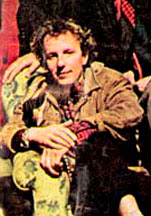 Another day another play... On Friday Owen and I went to see Tennessee William's THE ROSE TATTOO at the Olivier Theatre. I was a bit worried bearing in mind Owen had hated the last two plays we saw that after about 15 minutes he would shriek and run out of the seat but happily he stayed.
Another day another play... On Friday Owen and I went to see Tennessee William's THE ROSE TATTOO at the Olivier Theatre. I was a bit worried bearing in mind Owen had hated the last two plays we saw that after about 15 minutes he would shriek and run out of the seat but happily he stayed. This was again a play I had never seen onstage but had read it and of course had seen the 1954 film starring Burt Lancaster and the force of nature that was Anna Magnani in her Academy Award-winning role. The play was last staged in London during 1991 with Julie Walters and Ken Stott and it's relative rarity is probably due to the fact it needs a fairly big cast as well as an actress of particular power who can carry the play for two-and-a-half hours.
This was again a play I had never seen onstage but had read it and of course had seen the 1954 film starring Burt Lancaster and the force of nature that was Anna Magnani in her Academy Award-winning role. The play was last staged in London during 1991 with Julie Walters and Ken Stott and it's relative rarity is probably due to the fact it needs a fairly big cast as well as an actress of particular power who can carry the play for two-and-a-half hours.Set in the Sicilian community of a village outside New Orleans, Serafina (played here by Zoe Wanamaker) is the proud seamstress wife of a truck driver who is smuggling drugs in his truck for the local mafia. She remains blind to this, only aware he is earning enough to better their circumstances as befits his origins as the son of a Baron in the homeland. She is delighted to be in the early stages of pregnancy and despite a visit from a glamorous woman who shows a particular interest in his photograph and wants a shirt of rose-coloured silk made for her Sicilain lover, Serafina is eager for his return home. Then she hears the news the neighbours are too scared to tell her... her husband is dead, shot by the police chasing his truck.
 Serafina spirals into a mournful depression that lasts for three years, rarely leaving the house distancing the women of the town who disapprove of her slovernly appearance and fiery temper and the local priest for having her husband cremated and keeping the ashes. She is also driving her daughter Rosa to despair just as she discovers the joy of love with the sailor brother of a schoolfriend much to Serafina's disgust.
Serafina spirals into a mournful depression that lasts for three years, rarely leaving the house distancing the women of the town who disapprove of her slovernly appearance and fiery temper and the local priest for having her husband cremated and keeping the ashes. She is also driving her daughter Rosa to despair just as she discovers the joy of love with the sailor brother of a schoolfriend much to Serafina's disgust.On the day of her daughter Rosa's graduation ceremony Serafina is confronted with the life she has tried to hide from. When she upbraids a customer for being common the woman lashes out with the fact Serafina's husband was sleeping with the glamorous woman who called the night he was killed. Serafina attacks them and the police are called. A cowed Serafina is visited by Rosa and her sailor boyfriend but rouses herself to make him swear in front of a statue of the Virgin that he will not lay a hand on Rosa. But it's when her home is invaded by the macho presence of Alvaro Mangiacavallo, a truck driver hurt in a fight on her doorstep that Serafina realises life may not be over.
 It was great to finally see this on stage although it wasn't a perfect production possibly due to the fact that the original director Stephen Pimlott died after only one week's rehearsal and was replaced by Nicholas Hytner. At two and a half hours the production seemed sometimes more than a little padded, there seemed to be lots of extraneous business during scene changes involving children and the village women - to say nothing of a real-life ram, chased around the apron of the stage during two scenes - poor bugger. Some of the other supporting roles were a bit wooly too with vocal coaching seemingly by Blanche from The Golden Girls and it was sad that their was no bigger role for the multi-talented Marilyn Cutts other than as a head-shaking villager. But Zoe Wanamaker was remarkable as Serafina. Seemingly playing against type, she was voluble, comic, broken, loud, tragic and bursting with energy. Although he was truly awful in the Vanessa Redgrave HECUBA at the Albery a few years ago, Darrell D'Silva brought great life and comic vitality to the bumbling Alvaro.
It was great to finally see this on stage although it wasn't a perfect production possibly due to the fact that the original director Stephen Pimlott died after only one week's rehearsal and was replaced by Nicholas Hytner. At two and a half hours the production seemed sometimes more than a little padded, there seemed to be lots of extraneous business during scene changes involving children and the village women - to say nothing of a real-life ram, chased around the apron of the stage during two scenes - poor bugger. Some of the other supporting roles were a bit wooly too with vocal coaching seemingly by Blanche from The Golden Girls and it was sad that their was no bigger role for the multi-talented Marilyn Cutts other than as a head-shaking villager. But Zoe Wanamaker was remarkable as Serafina. Seemingly playing against type, she was voluble, comic, broken, loud, tragic and bursting with energy. Although he was truly awful in the Vanessa Redgrave HECUBA at the Albery a few years ago, Darrell D'Silva brought great life and comic vitality to the bumbling Alvaro.




























